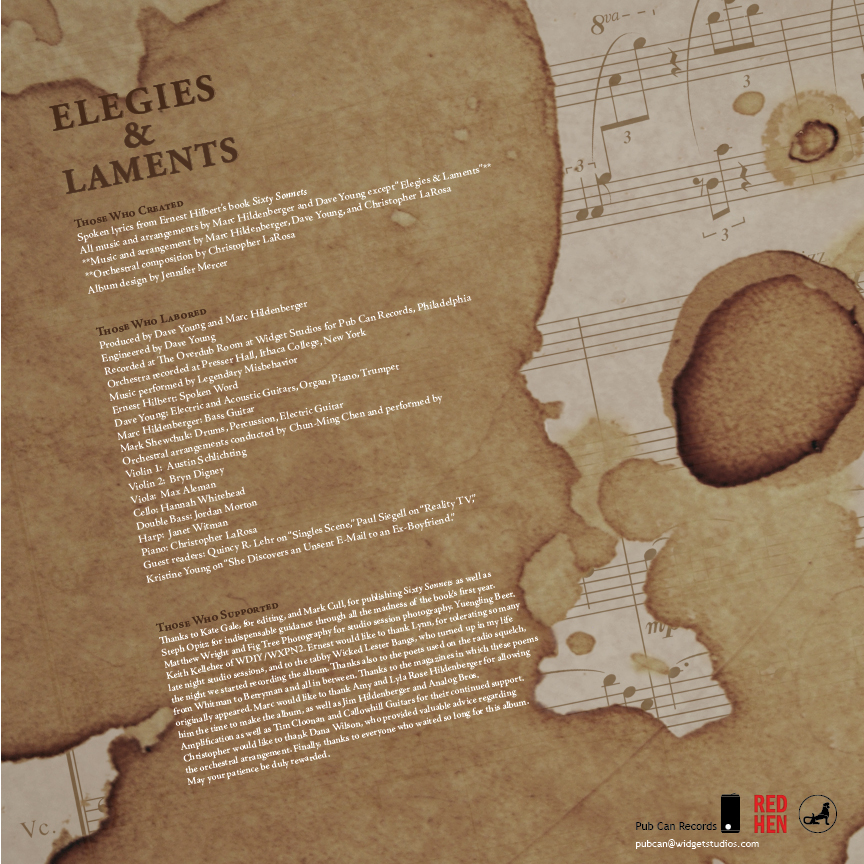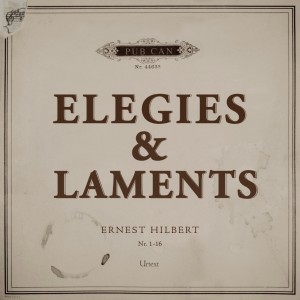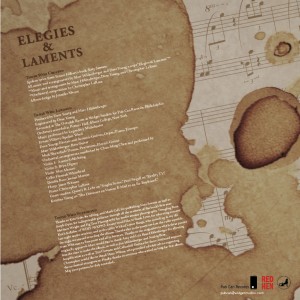The editors of Raintown Review have kindly granted me permission to reproduce online a review of the album Elegies & Laments, recorded for Pub Can Records with the band Legendary Misbehavior, featuring Marc Hildenberger and Dave Young. The review, by the guitarist for the Brooklyn band Black Statues, reminds me of the free-association style liner notes found on the backs of jazz and experimental rock LPs from the 1950s and 1960s, an energetic and imaginative attempt to get at the essence of a musical experience rather than merely issue a calculated assessment. I find this review amusing and actually quite refreshing in its boldness and, frankly, its weirdness. So, without further ado, here’s Edward Raison’s review of Elegies & Laments.
* * *
Ernest Hilbert and Legendary Misbehavior
Elegies & Laments
Pub Can Records, 2013
CD: $10 MP3: $5 LP: $25 Also streaming on all major services
On Ernest Hilbert’s CD, Elegies & Laments, we get five tracks that expand poems from his debut volume, Sixty Sonnets, into audio-book chapters, set to a rich variety of music, found audio snippets, and other noises. There are plenty of reviews and textual analyses of Sixty Sonnets available which explore the literary dimensions of the “Hilbertian Sonnet,” but this CD is engineered to be taken on its own, appreciated as any other album of songs. Perhaps the packaging could be used as a surface for cleaning one’s botanical samples, or portioning out one’s analgesic supply.
There’s a cinematic depth to it. The album opens with “Failed Escapes,” which is introduced by the indeterminacy of a radio dial being spun to deliberately reveal frequencies that contain Auden, Whitman, Kerouac, and other crackling voices of the previous century. In Hilbert’s universe, they’re in the place of the Jesus-preaching, Satan-outcasting, top forty hit-swilling, morning zoo monkey-chattering, and bombastic ad cacophonizing that usually floats down through the AM/FM transom. “Failed Escapes” inhabits the sonic narcissism of the leering ‘80s Art Film scored with surf-guitar, the bombast of Rock, the heavy-lidded, opiated navel-gazing of Jazz. The bleak surrealist-noir landscape of the depraved psyche where “Memory is just a haunting of ghosts,” as he puts it in his sonnet “Corned Beef Hash and Two Eggs Over Easy, Coffee.”
Another spin of the dial brings us to “Legendary Misbehavior.” Flat, mid-century, Midwestern accents, and horn-rimmed glasses. How to speak “hip.” Stand by your man, even when he throws your kitty-cat into a wood chipper, as happens in Hilbert’s sonnet “Domestic Situation.” America == Rome == Love == Pain == Desperation == Ennui == Insanity == Blood == Semen == Death == Poetry. Blackbird. No! Bluebird! An epic wah-wah guitar melts your god-damned face off and kills poetry dead.
In “Satires & Observations” the master of ceremonies wears polyester and a mustache, the monologues are hip, man, hip, and I suspect I don’t have the suavity to play it cool much longer as I am a nonsensical aggregation of protoplasm, and the narration sounds like random syllables spliced together on a reel-to-reel by a CIA scientist who is subjecting me to sinister hallucinogenic research. There’s too much seething dread and I’m developing an uncomfortable hotness-under-the-collar from the nagging suspicion that I’m being called out for being under-prepared for life, in a way I’m not educated enough to fully understand. The music makes it all bearable, though, once I let it feel its way up under my epidermis and I feel the cool, prickly numbness spreading gently through my pain and amalgamating my consciousness with the entire universe.
In the title track “Elegies & Laments,” we get a desolate summation of and reflection upon this American Nightmare, packed into the image of scullers rowing on an Ivy League river, “winners, champions, built only to die.” The string section swells and crescendos like the soundtrack to a scholastic training film on how to survive a nuclear attack by crouching under your desk. However, in the end, there’s nothing but Slim Pickens riding The Bomb filled with human frailty right down on top of us to annihilate any chance of anyone ever uniting with the divine for more than an ephemeral moment that is lost forever in an ocean of pain and confusion.
The album ends with “The War Correspondent Returns to his Neighborhood.” At this point I’m hoping Hilbert will comfort me, throw me a bone, grant me a boon, give me some reason to live after revealing andflogging me with the vastness of the creeping horror that seethes under this log. He’s cleverly induced a low-level PTSD with his insidious record, and now all he has to offer in recompense for creating this condition in the listener is a description of the predicament of the war correspondent, “Who can write of such things as become clear/And sane because they are so painfully near?” Whatever, Hilbert. Now how the hell am I going to write this review? All in all, though, my only complaint about “Elegies & Laments” is that there isn’t any saxophone.
– Edward Raison, Brooklyn, NY





No Comments